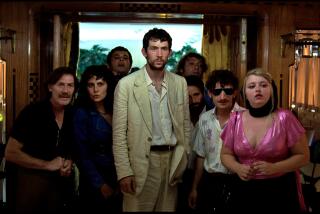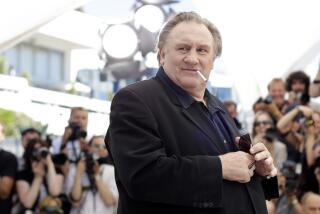Beauty, talents of Catherine Deneuve on display
FOR MUCH of her life, Catherine Deneuve, who turns 65 this year, has been a leading lady of European art cinema, not to mention an avatar of European beauty and glamour. In her native France, she is literally an iconic figure, having served as the face of Chanel, of Yves Saint Laurent, and even at one point of Marianne, the idealized emblem of the French Republic.
At last month’s Cannes Film Festival, she missed out on the best actress trophy but received a special jury award, the 61st Festival Prize, that amounted to a career achievement award (the other recipient was Clint Eastwood).
Deneuve’s résumé spans nearly 50 years and 100 movies. She started in the early days of the French New Wave and worked with some of the movement’s key directors, including Jacques Demy (“The Umbrellas of Cherbourg”) and François Truffaut (“ Mississippi Mermaid”). She has spanned multiple generations of major European filmmakers, from Luis Buñuel (“Belle de Jour”) and Roman Polanski (“Repulsion”) to some of today’s more interesting auteurs, among them Lars von Trier (“Dancer in the Dark”) and Arnaud Desplechin (this year’s superb Cannes entry “A Christmas Tale”).
A filmography this long and prolific is bound to have its fallow patches. Lionsgate’s Catherine Deneuve collection, out Tuesday, is far from a greatest hits compilation -- the five films here, which range from feeble to quite good, have largely been forgotten -- but it does attest to her beguiling consistency. Even in the most pedestrian movies, you could count on her to be a movie star.
From the beginning, people have tended to remark on Deneuve’s looks more than her talents, but in her case, the two often seem closely linked. David Thomson in his “A Biographical Dictionary of Film” calls her beauty “a receptacle for any imagination,” which might sound like a back-handed compliment, but Deneuve, unlike many screen sirens, is always subtly in control of her appearance, coolly aware of her sexual allure.
(The Deneuve set is part of Lionsgate’s ongoing series devoted to European sex symbols, after earlier Brigitte Bardot and Alain Delon collections; a four-film Sophia Loren set is also being released this week.)
The chosen films represent a variety of genres -- thriller, comedy, drama -- but all center ultimately on romance, which is to be expected since Deneuve was pegged early in her career as a certain kind of feminine ideal, both icy and sensuous.
The earliest movie here, Jean Aurel’s “Manon 70,” dates to 1968 and seamlessly updates the amoral treachery of Abbé Prévost’s 18th century source novel to the hedonistic swinging ‘60s. Deneuve’s Manon has a taste for designer clothes and yacht vacations -- which her generous older lovers are happy to satisfy -- but complications ensue when she begins an affair with a penniless journalist (Sami Frey).
Most of these films pair Deneuve with a male lead of equal stature. In Robin Davis’ humdrum “Le Choc” (1982), she’s an unhappily married farmer who falls for Delon’s weary hit man, predictably forced into one last job before retirement. In Jean-Paul Rappeneau’s “Le Sauvage” (1975), her ditsy bride-to-be gets cold feet and winds up on an island with suave perfumer Yves Montand. Deneuve strives to match the slapstick tone, but the madcap flailing is highly out of character.
Her role in “Fort Saganne” (1984), Alain Corneau’s plodding, three-hour period epic, is basically a glorified cameo, though her celebrity journalist, who lures war hero Gerard Depardieu into her boudoir, does enliven the film for about 10 minutes.
André Téchiné’s “Hôtel des Amériques” (1981) is the best of the lot and is also the one that best showcases Deneuve as an actress. She plays an anesthesiologist who, while still grieving for a dead lover, plunges into a volatile relationship with a younger man (Patrick Dewaere). Like many films by Téchiné (who went on to direct Deneuve in some of her best films, including “My Favorite Season”), it’s a vivid map of emotional turbulence and trauma, and Deneuve, ever the queen of understatement, captures a range of contradictory feelings without breaking a sweat.
More to Read
The biggest entertainment stories
Get our big stories about Hollywood, film, television, music, arts, culture and more right in your inbox as soon as they publish.
You may occasionally receive promotional content from the Los Angeles Times.






